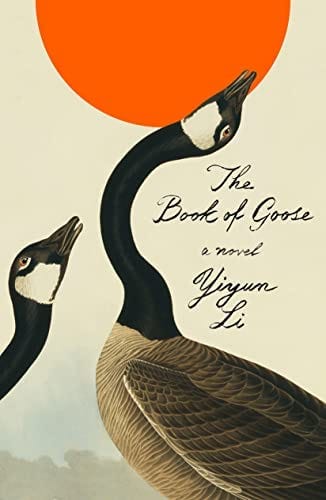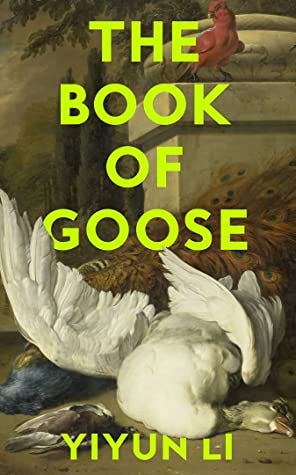It’s not always fair, but some artists just get the benefit of the doubt. Yiyun Li is one of those artists for me; no matter what puts out, I’ll give it a read. Such is the strength of books like Where Reasons End, Dear Friend, From My Life I Write to You in Your Life, and Gold Boy, Emerald Girl that even a relative misstep – 2020’s Must I Go – can be optimistically written off as a rare miss. (And Must I Go was a big, big miss - a novel that may have been more appropriately called Must I Read? and experientially succeeded in proving that behind every boring man is a much more interesting woman, ramming this point home by spending way too much time on the man’s life.) With the release of her new novel, The Book of Goose, I can now cheerfully report that order in the universe has been restored, our long national nightmare is over, Yiyun Li has written another good book.
The Book of Goose is a nesting doll of different narratives, but the overarching story is of the friendship between Agnès Moreau and Fabienne Martin, two peasant girls living in a small town in postwar France. The girls, absent adult supervision - Fabienne is motherless, and Agnès is the youngest of five siblings - form an intense bond, playing games and inventing worlds in order to transcend their quotidian and oftentimes brutal lives. If the squalor of the village itself wasn’t gothic enough, both of their lives are ringed by the tragic: Fabienne’s sister dies in childbirth, and Agnés’ brother comes back consumptive from a prisoner of war camp. Their friendship, forged from such an environs, is made of things deeper than can be understood. As Agnès explains:
“… a child does not seek to bond with another child. The bond, defying knowledge and understanding, either is there, or is not; once a bond comes into existence, no child knows how to break from it until the setting is changed. It baffles me that often songs and poems are written about love at first sight: those who claim to experience the phenomena have preened themselves, ready for love. There is nothing extraordinary about that. Childhood friendship, much more fatal, simply happens.”
The two girls decide on a new game – writing a book, bringing their invented worlds into the real – and the mechanism of the plot lifts off from there. Fabienne comes up with the stories, and Agnès, being more schooled, writes them down, and with the editing help of a recently widowed postmaster, Fabienne and Agnès bring the unholiest of creations into the world - a short story collection.
Fabienne and Agnès’ relationship is built on Fabienne’s domineering ways and Agnès’ passivity; both of them take on the world with absolute force, but in paradoxically dovetailing ways. Fabienne wants to mold the world to her vision of it; Agnès will do anything for her, her refusal to make any decision feeding Fabienne’s will to power. It is this enflaming tension between the two girls that Li mines throughout the book, Fabienne working the limits of her influence on the world while Agnès willfully allows the world to wash around her, two sides of the same coin. As Agnès writes, “were we not, in a sense, two blind girls?… Fabienne and I were in this world together, and we had only each other’s hands to hold on to. She had her will. I, my willingness to be led by her will.” Fabienne doesn’t want her name on the book, another one of her games, and thus Agnès takes on the role of child prodigy after the book becomes an unexpected success, the girl’s stories of rugged country life lapped up by the Parisian bourgeoisie.
Agnès, thanks to Fabienne’s maneuverings, gets to live the life of a star author, taking trips to Paris as the darling of the press. There’s nothing the media loves more than a precocious debut author, and Agnès becomes the apple of many people’s eyes – people with the same reality-altering inclinations as Fabienne, but without Fabienne’s care for Agnès. Mrs. Townsend, the head of a British girls’ finishing school, becomes fixated on Agnès, and takes her on as her ward, spiriting Agnès away to England. The forced separation of Fabienne and Agnès introduces another meta layer to the book, as their relationship can only live in letters, and Fabienne instructs Agnès to also write to “Jacques,” her fake brother and Agnès’ new boyfriend. It’s within this fiction that Agnès and Fabienne (via Jacques) can express their more subterranean and subtextual feelings for one another, the created world of the letters standing in for the real world.
This tension between the fictive and the real, and how real the fictive can be and how hollow the real can be, runs in tandem with Fabienne and Agnès’ duel of manipulation and passivity. Agnès, living the life that Fabienne has created for her, wants to push the fiction further and further, until it runs into a hard, and heartbreaking, limit. Reading the book, and the girls’ competing fictions, I was reminded once again of Vila-Matas’ Montano’s Malady: “There is nothing sometimes father away from reality than literature, which is constantly reminding us that life is like this and the world has been organized like that, but it could be otherwise. There is nothing more subversive than literature, which aims to return us to true life by exposing what real life and History smother.” What could be and what the world allows are two far-off poles; fiction allows the two girls something in between, but it is not something that can last forever.
Li’s writing is as strong as it’s ever been, her metaphors just as surprising and slantwise as usual, their recurrence and shifting meanings throughout the book a trademark of hers. Oranges, apples, knives, diamonds, whetstones, geese; all these objective correlatives morph and gain power throughout the book. There’s a subversive sense of glee with which Li skewers literary culture itself, on the many hangers-on who try to impress themselves onto a new talent, sublimating their own literary desires on what they imagine to be a blank canvas. With so many frame narratives on this book, though, there are times where Agnès’ narration strains credulity; she’s supposed to be writing of the past as an older adult, but maintains her childish naïveté in certain scenes; it wouldn’t really matter if older Agnès had stepped back soon after the beginning of the novel, but she pops up with regularity. Not that these interjections are bad, but it is a little difficult to hold the two Agnï in your head, one wizened by age and the other in the process of gaining that wisdom. But that’s the messy part of any recounting, anyway, of any abdication of the present tense in fiction. What you know now is always different than what you knew then, and there’s no way to truly write as if you don’t know what you know now;1 anyway, the rest of the book is good enough to wave that away. That’s the benefit of the doubt that any good novel affords. The Book of Goose earns it with its humor, its beauty, its unsentimental conclusions, its ephemeral, holistic novelistic quality. It’s a well put-together novelistic machine; Yiyun Li is back, having held up her end of the fictive bargain we share.







Ooh La La!!
Thanks for this, Evan. I’m reading your last subject, “The Index of Self-Destructive Acts” … Donna Tartt without the flab. And funnier, sweeter.